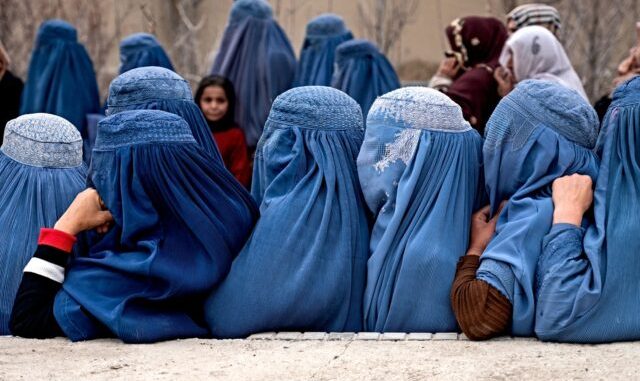
| Published August 8, 2025
Taliban Weaponizes Justice to Oppress Women—U.N. Expert Sounds Alarm
U.N. special rapporteur Richard Bennett denounced the Taliban’s systematic dismantling of Afghanistan’s legal and judicial framework, describing it as a weapon of oppression amounting to “crimes against humanity.”
Key Revelations
-
Suspension of Women’s Protections
The Taliban revoked the 2004 Constitution and scrapped laws—such as the landmark act criminalizing 22 forms of violence against women—that once protected women’s rights. -
Judicial Purge
Approximately 270 female judges were removed and replaced with male appointees aligned with Taliban ideology, often lacking legal credentials. -
Widespread Restrictions on Women
Women are barred from education beyond the sixth grade, prohibited from most employment, and excluded from public spaces like parks, gyms, and beauty salons. Dictates even extend to silencing women’s voices and covering their faces in public. -
Denial of Justice
With no female judges, prosecutors, or lawyers, women face significant obstacles in accessing legal recourse—whether for abuse, custody disputes, or civil matters. Courts often reject their cases, forcing many to rely on informal, male-led justice systems that lack safeguards for their rights. -
Call for Global Legal Action
Bennett urged international communities to pursue legal avenues, including ICC arrest warrants and cases at the International Court of Justice under CEDAW, to hold the Taliban accountable.
Broader Context & Significance
UN and human rights organizations have increasingly described the regime’s treatment of women as “gender apartheid”—a systematic erasure of half the population from public and legal life.
In January 2025, the ICC issued arrest warrants for Taliban Supreme Leader Hibatullah Akhundzada and Chief Judge Abdul Hakim Haqqani on grounds of crimes against humanity for their campaign of gender persecution.
Women who engage with the Taliban court system face a hostile, male-dominated environment, the report said. (AP Photo: Ebrahim Noroozi)
 Implications:
Implications:
Here are the main implications of the U.N. expert’s findings on the Taliban’s oppression of women:
1. Legal and Human Rights Consequences
-
Crimes Against Humanity Charges:
If the International Criminal Court (ICC) takes up the case, Taliban leaders could face arrest warrants—limiting their ability to travel or access international funding. -
Gender Apartheid Precedent:
The use of “gender apartheid” as a legal term could set an international precedent, making it easier to prosecute systemic gender-based oppression in other countries. -
Pressure on the U.N. and Member States:
The report increases political pressure for sanctions, arms embargoes, and travel bans targeting Taliban officials.
2. Geopolitical and Diplomatic Fallout
-
Harder Path to Recognition:
Any remaining hopes the Taliban had for international recognition as Afghanistan’s legitimate government are now even slimmer. -
Regional Strain:
Neighboring countries—especially Pakistan, Iran, and Central Asian states—may face more refugee outflows as Afghan women and their families flee persecution. -
International Intervention Debate:
Could reignite discussions about non-military interventions such as international legal tribunals, targeted cyber sanctions, or covert humanitarian aid networks.
3. Social and Economic Impact Inside Afghanistan
-
Economic Decline:
Barring women from legal, educational, and professional roles further cripples Afghanistan’s economy—already heavily dependent on foreign aid and informal markets. -
Loss of Talent:
Afghanistan is losing an entire generation of skilled female professionals—lawyers, judges, teachers—leading to a long-term brain drain. -
Public Trust Collapse:
With courts now fully Taliban-controlled and hostile to women, ordinary Afghans (especially female-headed households) are left with no legal recourse for property disputes, domestic violence, or inheritance claims.
4. Humanitarian Ripple Effects
-
Foreign Aid Complications:
Some nations may reduce or halt direct aid to Taliban-run ministries, shifting support to NGOs, which could be blocked by Taliban restrictions. -
Underground Resistance Networks:
Women’s rights groups—many already operating in secret—may receive more funding from the diaspora and sympathetic governments. -
Humanitarian Crisis Escalation:
Without access to justice, vulnerable women and children are more exposed to forced marriages, exploitation, and trafficking.
5. Long-Term International Law Impact
-
CEDAW Enforcement Test:
This could be the most high-profile test of the Convention on the Elimination of All Forms of Discrimination Against Women since its adoption, determining how enforceable it truly is. -
Blueprint for Other Oppressive Regimes:
If the Taliban faces no serious consequences, other authoritarian governments might see gender-based legal dismantling as a low-risk tool of control.

 Overall Takeaway:
Overall Takeaway:



Be the first to comment